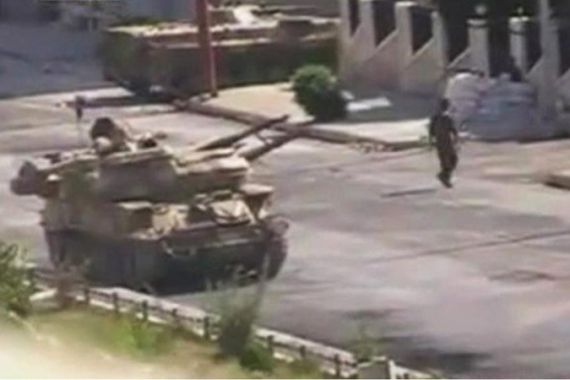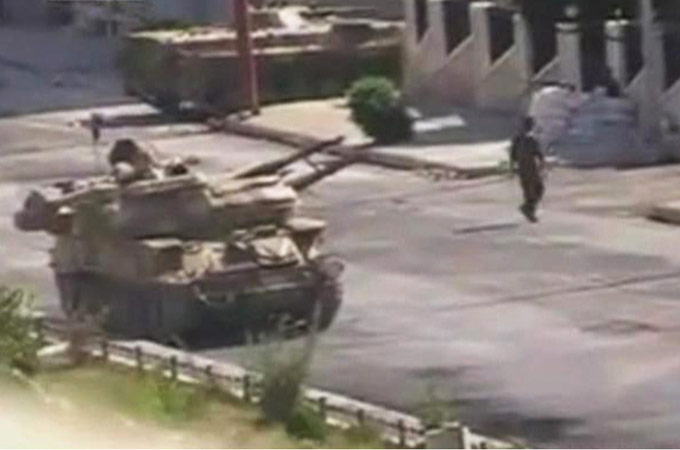Syria forces surround town after ‘defections’
Troops backed by tanks deployed around Rastan after “tens of soldiers” from the area reportedly defected.

 |
|
The army has been used in Syria’s nationwide crackdown on anti-government protesters [Reuters] |
Syrian forces have surrounded a town near the central city of Homs after the defection of tens of soldiers from the area, activists and residents say.
At least 40 light tanks and armoured vehicles, and 20 buses of troops and military intelligence, deployed at 5:30am (2:30GMT) on Monday at the highway entrance of Rastan, 20km north of Homs and began firing heavy machine guns at the town, two residents said.
“The tanks deployed at both banks of the highway, which remained open, and fired long bursts from their machine guns at Rastan,” one of the residents, who gave his name as Raed, told Reuters news agency by phone.
He said defections began in the town when it was stormed by tanks three months ago to crush large street protests against President Bashar al-Assad. The assault reportedly killed dozens of civilians.
Rastan has been the site of intense anti-government protests in recent months.
Elsewhere in Homs province, military tanks and security forces entered the village of Heet in the morning.
The UK-based Syrian Observatory for Human Rights (SOHR) told Al Jazeera that security forces had burned houses and arrested “tens of people”.
“There are many wounded because of the indiscriminate shooting in the streets,” Rami Abdulrahman, director of SOHR, said.
Heet is located at the border with Lebanon and an official in the Lebanese border region of Wadi Khaled confirmed the presence of military in the Syrian village.
Defections ‘increasing’
Reuters reported that since the demise of Muammar Gaddafi’s rule over Libya, activists and residents have been reporting increasing defections in the Syrian army.
They claim there have been desertions in the eastern Deir ez-Zor province, the northwestern Idlib province, the Homs countryside and at the outskirts of Damascus.
On Sunday, residents reported overnight gun battles between defected troops and Assad supporters backed by security forces near the Damascus suburb of Harasta. The clashes reportedly started after four to five soldiers joined the anti-Assad protests.
A statement published on the internet by the Free Officers, a group that says it represents defectors, said “large defections” occurred in Harasta.
It was the first reported defections around the capital, where Assad’s core forces are based.
“The younger conscripts who defect mainly go back to their town and villages and hide. We have seen more experienced defectors fighting back in the south, in Idlib, and around Damascus,” said an activist who gave his name as Abu Khaled.
The apparent fall of Gaddafi has coincided with increased international pressure on Assad for his repression of protests, with European Union sanctions on the oil sector that could come as early as this week.
The Arab League said on Sunday it was concerned “over the dangerous developments on the Syrian arena that had caused thousands of casualties” and “stresses the importance of ending bloodshed and to resort to reason before it is too late”. The organisation also agreed to send its secretary-general to Syria to push for reforms.
At the Arab League meeting in Egypt, the Syrian representative Youssef Ahmad said “the response of the Syrian leadership to the just popular demands has helped stop the popular movement in many cities and their decline in other areas”.
He said the authorities were pursuing reforms but they would not “allow terrorism and extremism to target peaceful coexistence in Syria and the independence of its patriotic and national decisions”.
‘No place for autocratic regimes’
Meanwhile, Turkey, which has strong diplomatic ties with Syria, warned Damascus that “the only way out is to immediately silence arms and to listen to the people’s demands”.
“We have been watching the fate of those who didn’t chose this path in the past few months in Tunisia, in Egypt – and now in Libya – as a warning and with sadness,” Recep Tayyip Erdogan said in his monthly address aired on Turkish TV on Sunday.
“Demands for democracy and freedom are the people’s just demands. In today’s world, there is no place for one-man rule, for autocratic regimes and closed communities”.
Rights groups say more than 2,200 people have been killed since the uprising began in March.